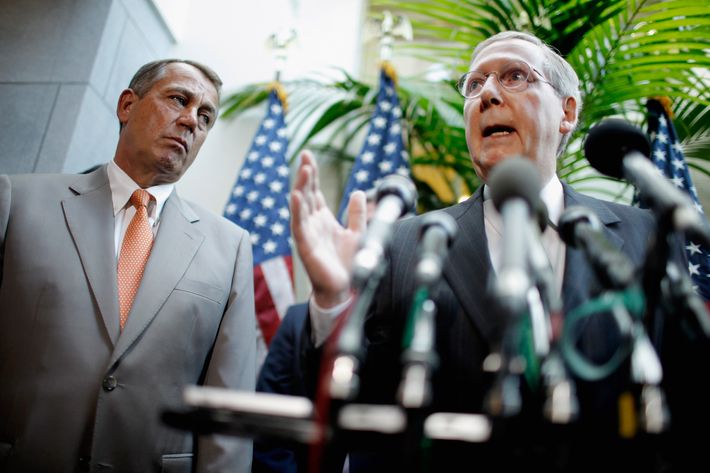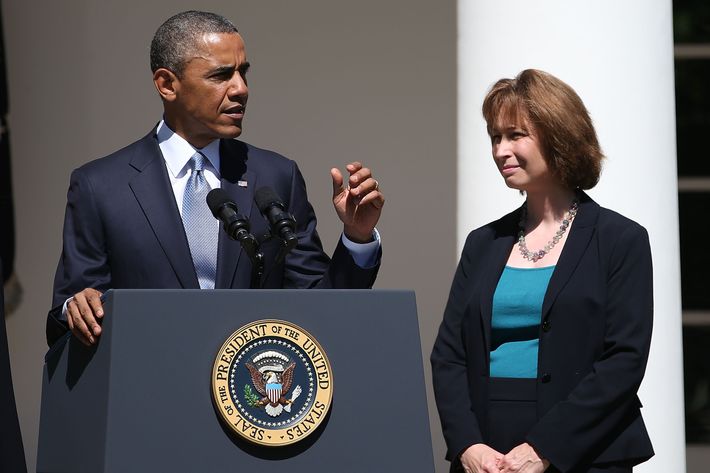
There are lots of people telling you what the race for control of the Senate is about. Maybe it’s about Republicans turning the Senate into a temple of bipartisan governance. Or it’s about stopping President Obama from making deals to cut Social Security, or transferring terrorists from Guantanamo Bay to prisons in Kansas (where they will break out and rampage through the countryside).
It’s not actually about any of those things. The contest to control the Senate is about one thing: whether Obama can confirm judges and staff his administration. This can all be seen through the power of political science.
Consider, first, what the race to control the Senate is not about. It’s not about passing legislation of any kind. The possibility that the Republican Senate might lead to legislative compromise has been suggested by professional bipartisans like Gerald Seib (“full GOP control of Congress might well shift Republicans’ focus from stopping him to making things happen”) and some of the more pragmatic Republicans, like Senator Rob Portman:
Portman, a fiscally focused Ohio Republican who is generally conservative but believes in bipartisan compromise, sees several areas of potential cooperation with the administration. He mentioned tax reform, a “grand bargain” on the budget, an energy bill—perhaps something that combines Keystone XL pipeline approval with reductions in carbon emissions—and new free-trade agreements, which Obama has supported but Senate Majority Leader Harry Reid has blocked. Portman, who voted against the bipartisan immigration-reform bill that passed the Senate last year, also believes a Republican-led immigration-reform bill could pass the House and Senate and potentially be approved by Obama.
Mmm, nope. The legislative dynamics in Washington are very simple. Gridlock exists because Obama and House Republicans cannot agree on legislation. If Obama and the House could agree on legislation, their deal would be approved by a Democratic-controlled Senate or by a Republican-controlled Senate. There are no plausible circumstances in which the Senate would block a deal struck between the House and Obama, because, whichever party controls the Senate, its ideological center will sit comfortably inside in the enormous space between Obama and the House Republicans. Ergo, the party that controls the Senate has no impact on legislative outcomes.
It is possible, though highly unlikely, that some bills will pass in the next Congress. But that would be because something has happened to change the House Republicans’ mind. (Like, say, the approach of the 2016 elections persuades them to try to neutralize immigration as an issue.)

There have been numerous attempts to argue around this simple dynamic, and they all get very hand-wavy. The bipartisan version is that Senatorial debate will somehow lead to an era of good feelings. The partisan version is that the Senate will join the House to pass laws unacceptable to Obama — like undermining Obamacare — that he will somehow be forced to sign anyway. But that scenario assumes that Republicans could use the threat of a government shutdown, which is their own leverage to make the president sign a bill he opposes, to make Obama knuckle under. And that is an obviously false assumption. Both sides understand fully well that a shutdown will turn the public against Congress. It is anti-leverage.
The federal elections are curiously boring this year. (There are tons of fascinating and important state-level elections.) The 2014 midterms are the first national elections in more than 16 years in which no important legislative changes are at stake. A presidential election always creates the possibility of creating a new legislative coalition, or destroying an old one. Previous midterm elections imposed important changes to the possibility for passing laws. The 2010 election killed Obama’s legislative majority. The 2006 midterms killed George W. Bush’s. The 2002 midterms gave Bush the Senate majority he used to revitalize his domestic agenda and pass a swath of Republican legislation. You have to go back to 1998, when Republican control of the House was not seriously contested, to find an election that had no serious effect on Washington’s ability to pass laws.
The race to control the Senate is not about legislation, because the pivotal negotiations on any legislation involve Obama and the House. Appointments are a different story, because the House has no power over appointments. The Senate has power over appointments. And this is the power that lies on the razor’s edge.
The Constitution gives the Senate, but not the House, power to approve the president’s appointments to federal judgeships and high-level executive branch jobs. Historically, the Senate operated under an informal understanding of how this power would be used. The president had a basic right to appoint judges and nominees who broadly reflected his ideology, but the Senate could veto a candidate who they deemed especially extreme, scandal-ridden, or incompetent.

The basic pattern in Washington has been, as polarization deepens, the two parties stop following informal understandings of their powers and start using their powers to the maximum legal degree. Senate Republicans realized there was no formal rule requiring they use their power to filibuster only for extreme or corrupt presidential nominees. So they started blocking executive branch appointments not out of any specific objection but to try to force Obama to accept changes to laws Republicans don’t like. They also started filibustering federal judges merely because they didn’t want Obama to appoint anybody at all to those seats. Senate Democrats counter-escalated by eliminating the filibuster for executive branch and federal court nominations.
This is where things stand right now: Obama can fill the judiciary and staff his administration because he has a majority of votes in the Senate. But if Republicans win the Senate, then they can block his appointments. Sahil Kapur has one of the few detailed reports I’ve seen explaining the Republican strategy to leverage their majority. The parties have no incentive to cooperate on judicial nominations — Republicans would be better off leaving a seat empty than allowing it to be filled with an even moderately liberal judge. They say they want to force Obama to appoint “more acceptable” judges — “Obama would have to present nominees that are much much more acceptable to Republicans, or they won’t even schedule hearings,” explains Randy Barnett, a powerful Republican legal strategist — but the only kind of judge they have any reason to accept is one likely to side with conservatives more often than liberals. And Obama has no incentive to appoint a judge like that.
The difference between 50 Democratic senators (plus a tie-breaking vote by Joe Biden) and 49 Democratic Senators is the difference between two full years of filling the judiciary and two years of likely gridlock. What’s more, if a Supreme Court justice becomes incapacitated or dies, the judicial gridlock could become a Constitutional struggle — a possibility I explored last spring, but which has gathered little attention. News reports have wildly overstated the legislative importance of Republican Senate control. At the same time, they have understated its importance to the judiciary.






























